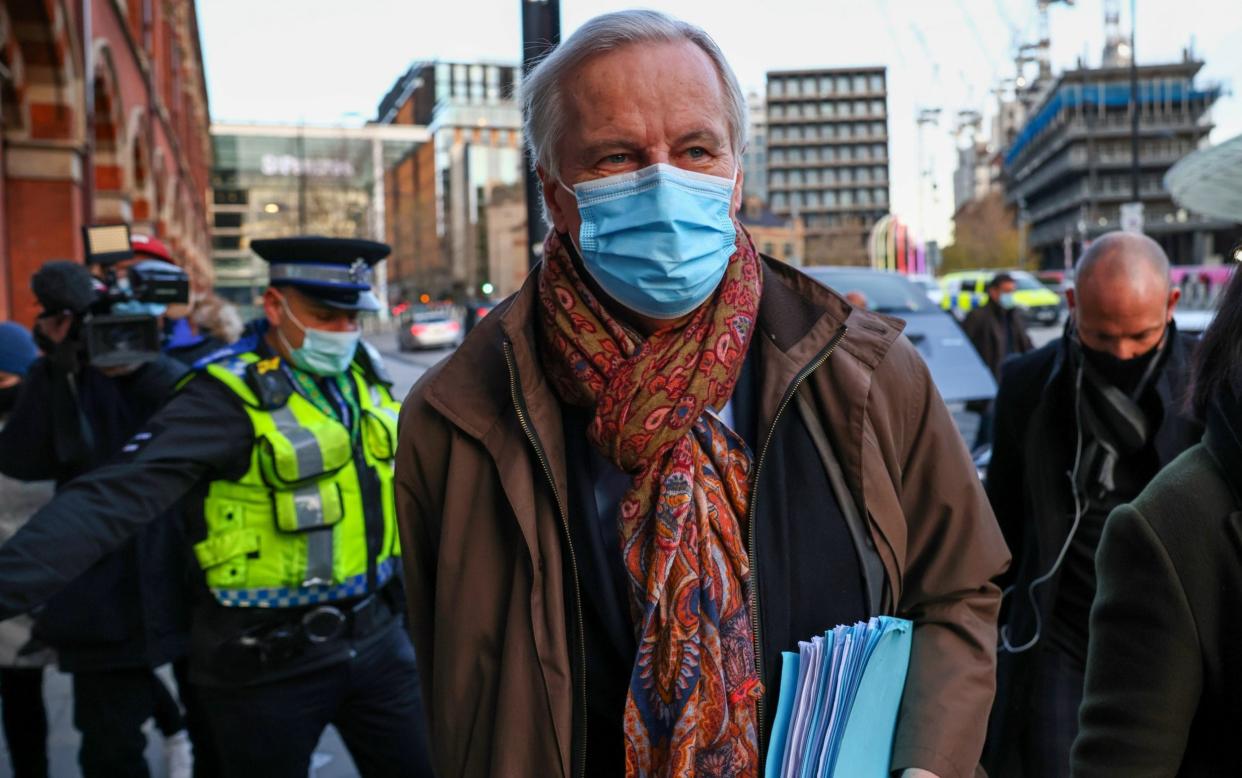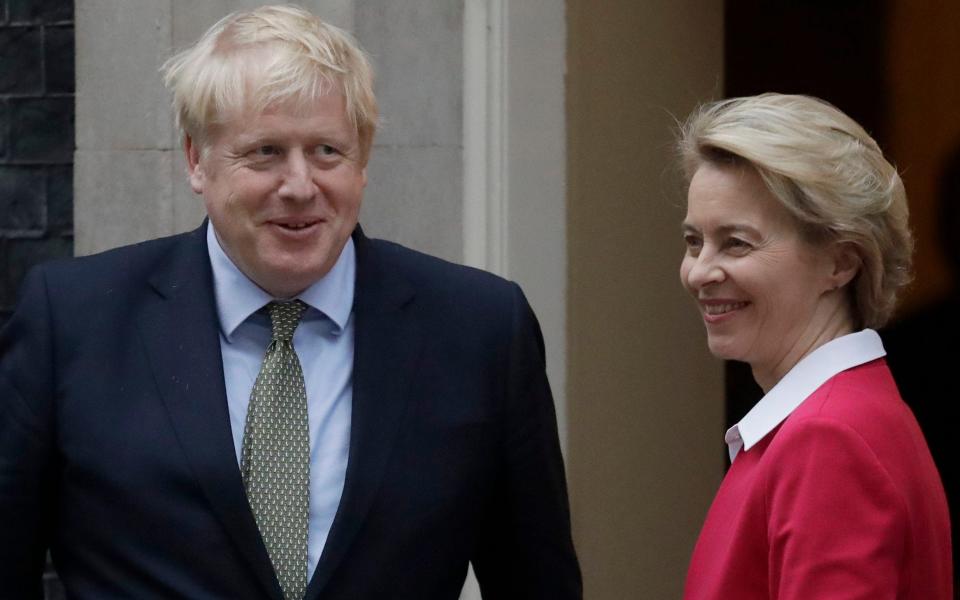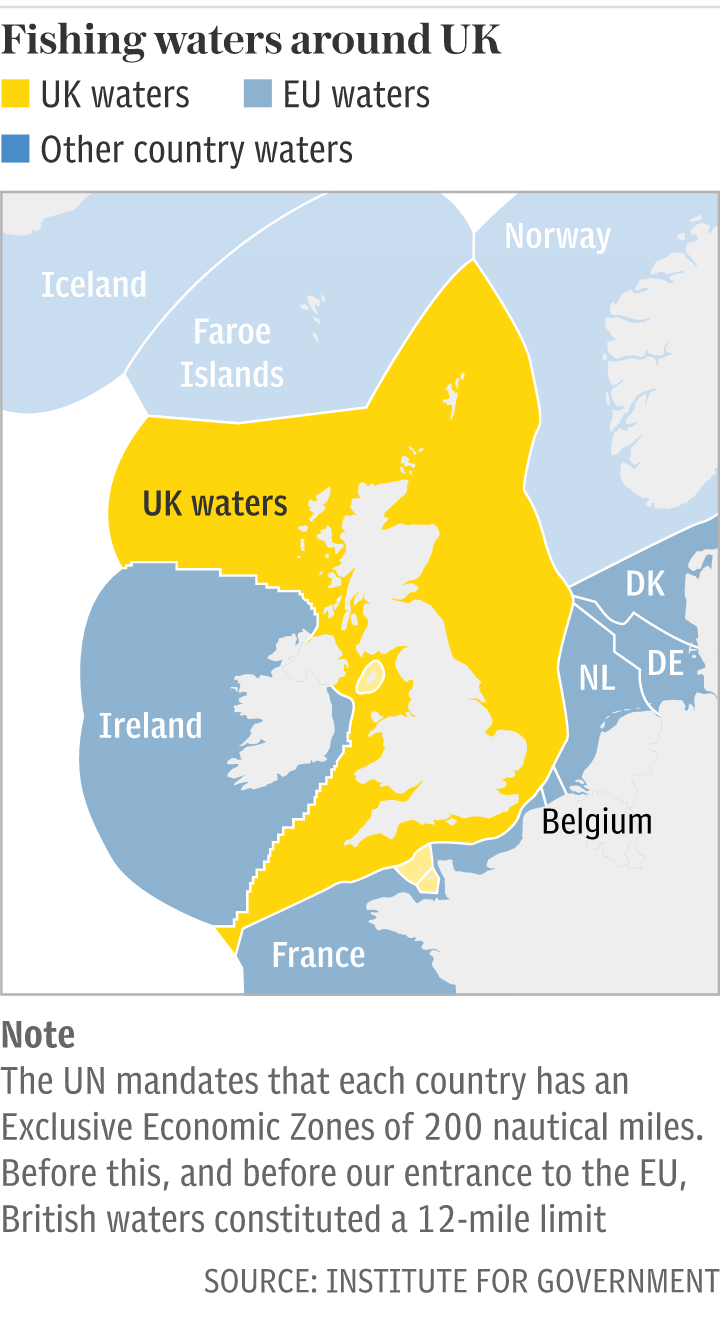Brexit trade deal hangs in the balance as EU makes 10-year fishing demand

Brexit trade talks reached stalemate on Friday night after the EU was accused of making a "ridiculous" demand for 10 years of unfettered access to Britain's fishing waters as the price of a deal.
Boris Johnson paused talks for a "stock take" of whether an agreement can still be salvaged.
A senior Government source said: "Their new offer was frankly laughable. They know we can't possibly accept it. It's ridiculous. If they think we will just cave in, they have made a massive miscalculation."
Mr Johnson will speak to Ursula von der Leyen, the European Commission president, on Saturday in an attempt to break the deadlock.
He could also make a personal plea to Emmanuel Macron, the French president, blamed for "destabilising" the talks by making unreasonable demands on fishing and state aid. Mr Macron is under pressure from other EU member states to give ground, with Angela Merkel, the German chancellor, on Friday urging "compromise" from both sides to get the deal over the line.
Downing Street warned that the time for talking has almost run out, setting a provisional deadline of Monday for a deal to be reached or for the negotiations to be wound up for good.
If no deal can be agreed, Britain will trade with the EU on World Trade Organisation terms from January 1, meaning there will be tariffs and increased checks on goods crossing the border.
Talks once again went on into the night on Friday but Michel Barnier, the EU's chief negotiator, is expected to return to Brussels on Saturday while leaders discuss the state of the talks before a possible resumption on Sunday.
British sources said that unless Mr Barnier is given a fresh mandate by the EU there cannot be a deal because Brussels is currently making demands that go way beyond the UK's red lines.
UK negotiators, led by Lord Frost, were understood to have been completely taken aback when the EU made its "laughable" demands on fish, which also included an offer to hand back just 18 per cent of its fishing quotas when the UK had asked for 80 per cent.
The EU also insisted at the 11th hour that any deal should give it the right to impose punitive tariffs on UK goods if Britain diverges from EU regulations in the future.
On Friday night, Lord Frost and Mr Barnier issued a joint statement, which said: "After one week of intense negotiations in London, the two chief negotiators agreed that the conditions for an agreement are not met, due to significant divergences on 'level playing field', governance and fisheries.
"On this basis, they agreed to pause the talks in order to brief their principals on the state of play of the negotiations. President Von der Leyen and Prime Minister Johnson will discuss the state of play."

France confirmed on Friday that it would veto a deal if it was not satisfied with it, while Mr Johnson was warned by Eurosceptic Tory MPs not to give any more ground in pursuit of an agreement.
One British source said: "As things stand, we are not going to get there unless Barnier gets a new mandate. Without some intervention from European leaders, it's not going to work. The onus is on them now because we have reached the end of the road in terms of how flexible we can be."
Lord Frost had told Mr Barnier that British sovereignty over its waters was non-negotiable, and both sides believed a deal was close on Thursday, with Britain allowing the EU to keep almost 50 per cent of its current quotas at the beginning of a multi-year transitional period, after which Britain would allocate quotas on an annual basis.
But at the last minute the EU demanded "total access" to British waters for 10 years, meaning Britain would have no control over who could fish in its waters or where. The bloc also reverted to its original offer of giving back just 18 per cent of its current quotas to Britain.

Pressure is being put on Mr Macron by other EU nations who have no Atlantic fishing fleets.
Mrs Merkel's spokesman, Steffen Siebert, said: "For the chancellor... the willingness to compromise is needed on both sides. If you want to have a deal, then both sides need to move towards each other. Everybody has their principles. There are red lines, that's clear – but there's always room for compromise."
Ireland's prime minister, Michael Martin, said he "fervently hopes" a deal can be reached this weekend, adding that Mr Barnier had to be allowed the "space" to conclude the talks.
Mr Martin added: "A deal is in the best interests of the United Kingdom, it's in the best interests of the island of Ireland, it's in the best interests of the EU. A sensible trade deal would be a very important step in the right direction for all of our peoples now, given the enormous negative impact of Covid-19 on our economic and social life."
Charles Michel, the president of the European Council, warned British negotiators that they risked no deal if they forced Mr Barnier into unpalatable compromises over fishing and subsidy law. Mr Michel said it was "essential" EU member states could back the deal Mr Barnier hopes to bring to them at a summit next Thursday.
France's European Affairs minister, Clement Beaune, said: "If there were a deal that isn't good... we will oppose it. Each country has a veto, so it's possible."
Downing Street declined to comment on whether Monday was regarded as a "hard deadline", saying only saying that time was "short".
A Number 10 spokesman said: "There are still some issues to overcome. Time is in very short supply and we are at a very difficult point in the talks. What is certain is we will not be able to agree a deal that doesn't respect our fundamental principles on sovereignty, fishing and control."

 Yahoo News
Yahoo News 
